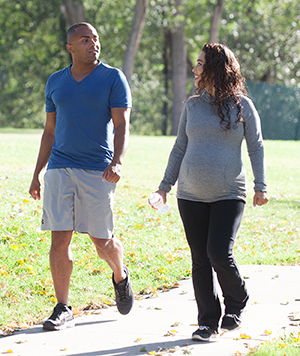Although common during pregnancy, some discomforts may seem worse in the final weeks. Simple lifestyle changes can help. Take care of yourself. And ask your partner to help out with small tasks.
Limiting leg problems
Ways to combat leg issues:
-
Wear support hose all day.
-
Don't wear snug shoes or clothes that bind, such as tight pants and socks with elastic tops.
-
Sit with your feet and legs raised often.
Caring for your breasts
Tips to follow include:
-
Wash with plain water. Don't use harsh soaps or rubbing alcohol. They may cause dryness.
-
Wear a nursing bra for extra support. It can also hide any leaks from your nipples.
Controlling hemorrhoids
Ways to prevent hemorrhoids include:
-
Eat foods that are high in fiber. Also exercise and drink enough fluids. This will reduce constipation and hemorrhoids.
-
Sleep and nap on your side. This limits pressure on the veins of your rectum.
-
Try not to stand or sit for long periods.
Controlling back pain
As your body changes during pregnancy, your back must work in new ways. Back pain has many causes. Physical changes in your body can strain your back and its supporting muscles. Also hormones increase during pregnancy. This can affect how your muscles and joints work together. All of these changes can lead to pain.
Pain may be felt in the upper or lower back. Pain is also common in the pelvis. Some pregnant women have sciatica. This is pain caused by pressure on the sciatic nerve running down the back of the leg. Ice or heat may help. Your provider may advise massage therapy or a chiropractor. Sleep on your left side with a pillow between your knees. Use a brace or support device. Ask your provider for specific tips and exercises to help control your back pain.
Tips to help you rest
Good rest and sleep will help you feel better. Here are some ideas:
-
Ask your partner to massage your shoulders, neck, or back.
-
Limit the errands you do each day.
-
Lie down in the afternoon or after work for a few minutes.
-
Take a warm bath before you go to sleep.
-
Drink warm milk or teas without caffeine.
-
Don't drink coffee, black tea, and cola.
Stopping heartburn
|
|
Managing mood swings
Ways to manage mood swings include:
-
Know that mood changes are normal.
-
Exercise often, but get plenty of rest.
-
Address any concerns and limit stress. Talking to your partner, other women, or your healthcare provider may help.
Dealing with urinary frequency
Tips to deal with having to urinate often include:
-
Drink plenty of water all day. But if you drink a lot in the evening, you may have to get up more in the night.
-
Limit coffee, black tea, and cola.
How daily issues affect your health
Many things in your daily life impact your health. This can include transportation, money problems, housing, access to food, and child care. If you can’t get to medical appointments, you may not receive the care you need. When money is tight, it may be difficult to pay for medicines. And living far from a grocery store can make it hard to buy healthy food.
If you have concerns in any of these or other areas, talk with your healthcare team. They may know of local resources to assist you. Or they may have a staff person who can help.


